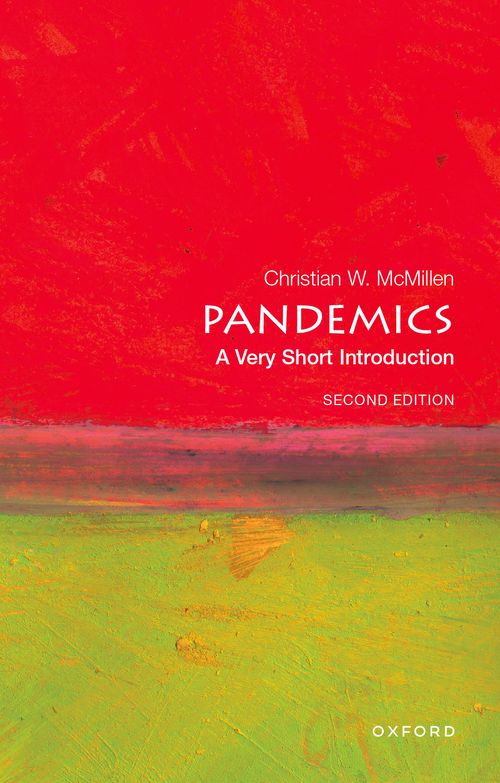Home >
A Very Short Introduction >
パンデミック(第2版) (Medical)
A Very Short Introduction | Medical
パンデミック(第2版)
ISBN: 9780197762004
Series: A Very Short Introduction
パンデミック(第2版) (Medical)
A Very Short Introduction パンデミック(第2版) (Medical) メディア > 書籍 > ノンフィクション > 言語学習書 Expect Delays of Up to 4 Weeks| ご注文はこちら |
ISBN
9780197762004 (旧規格ISBN: 019776200X)
- 説明
- シリーズの説明
The 2014 Ebola epidemic demonstrated the power of pandemics and their ability not only to destroy lives locally but also to capture the imagination and terrify the world. In 2019 and the years that followed, the coronavirus pandemic infected every continent and took the lives of millions. In this updated edition, Christian W. McMillen provides a concise yet comprehensive account of pandemics throughout human history, illustrating how pandemic disease has shaped history and, at the same time, social behavior has influenced pandemic disease. Extremely interesting from a medical standpoint, the study of pandemics also provides unexpected, broader insights into culture and politics.
This Very Short Introduction describes history's major pandemics--plague, tuberculosis, malaria, smallpox, cholera, influenza, and HIV/AIDS--highlighting how each disease's biological characteristics affected its pandemic development. McMillen discusses state responses to pandemics, such as quarantine, isolation, travel restrictions, and other forms of social control, and pays special attention to the rise of public health and the explosion of medical research in the wake of pandemics, especially as the germ theory of disease emerged in the late nineteenth and early twentieth centuries. Today, medicine is able to control all of these diseases, yet some of them are still devastating in much of the developing world. By assessing the relationship between poverty and disease and the geography of epidemics, McMillen offers an outspoken and thought-provoking point of view on the necessity for global governments to learn from past experiences and proactively cooperate to prevent any future epidemic.
This Very Short Introduction describes history's major pandemics--plague, tuberculosis, malaria, smallpox, cholera, influenza, and HIV/AIDS--highlighting how each disease's biological characteristics affected its pandemic development. McMillen discusses state responses to pandemics, such as quarantine, isolation, travel restrictions, and other forms of social control, and pays special attention to the rise of public health and the explosion of medical research in the wake of pandemics, especially as the germ theory of disease emerged in the late nineteenth and early twentieth centuries. Today, medicine is able to control all of these diseases, yet some of them are still devastating in much of the developing world. By assessing the relationship between poverty and disease and the geography of epidemics, McMillen offers an outspoken and thought-provoking point of view on the necessity for global governments to learn from past experiences and proactively cooperate to prevent any future epidemic.
難解なテーマを分かりやすく解説する入門書シリーズ
Very Short Introductions (VSI) シリーズは、1995年に Mary Beard 著『Classics』の刊行をもって創刊し、以来、歴史や政治、宗教、哲学、科学、時事問題、ビジネス、経済、芸術、文化など、様々な分野のテーマを取り上げてきました。発行点数も数多く、現在までに680タイトル以上を刊行しています。
本シリーズは、世界各国の評論家からの評価も高く、知識欲の強い読者の間では定番の入門書として定着しつつあります。販売部数は全世界で1,000万部を超え、53ヶ国語の言語に翻訳されています。
専門家による分析や新しい見解を盛り込みながら、イスラム教からポスト構造主義、宇宙論まで、難解なテーマを平易に説く、刺激に満ちた Very Short Introductions は、初学者にとって最適の入門書であり、予備知識のある読者には新たな視点を提供します。一般の方や大学生、大学院生に愛読されているほか、大学の授業にも採用されるなど、幅広くご活用いただいています。
注意:このシリーズはELT教材に該当しないため割引対象外です。
The 2014 Ebola epidemic demonstrated the power of pandemics and their ability not only to destroy lives locally but also to capture the imagination and terrify the world. In 2019 and the years that followed, the coronavirus pandemic infected every continent and took the lives of millions. In this updated edition, Christian W. McMillen provides a concise yet comprehensive account of pandemics throughout human history, illustrating how pandemic disease has shaped history and, at the same time, social behavior has influenced pandemic disease. Extremely interesting from a medical standpoint, the study of pandemics also provides unexpected, broader insights into culture and politics.
This Very Short Introduction describes history's major pandemics--plague, tuberculosis, malaria, smallpox, cholera, influenza, and HIV/AIDS--highlighting how each disease's biological characteristics affected its pandemic development. McMillen discusses state responses to pandemics, such as quarantine, isolation, travel restrictions, and other forms of social control, and pays special attention to the rise of public health and the explosion of medical research in the wake of pandemics, especially as the germ theory of disease emerged in the late nineteenth and early twentieth centuries. Today, medicine is able to control all of these diseases, yet some of them are still devastating in much of the developing world. By assessing the relationship between poverty and disease and the geography of epidemics, McMillen offers an outspoken and thought-provoking point of view on the necessity for global governments to learn from past experiences and proactively cooperate to prevent any future epidemic.
This Very Short Introduction describes history's major pandemics--plague, tuberculosis, malaria, smallpox, cholera, influenza, and HIV/AIDS--highlighting how each disease's biological characteristics affected its pandemic development. McMillen discusses state responses to pandemics, such as quarantine, isolation, travel restrictions, and other forms of social control, and pays special attention to the rise of public health and the explosion of medical research in the wake of pandemics, especially as the germ theory of disease emerged in the late nineteenth and early twentieth centuries. Today, medicine is able to control all of these diseases, yet some of them are still devastating in much of the developing world. By assessing the relationship between poverty and disease and the geography of epidemics, McMillen offers an outspoken and thought-provoking point of view on the necessity for global governments to learn from past experiences and proactively cooperate to prevent any future epidemic.
シリーズの説明
難解なテーマを分かりやすく解説する入門書シリーズ
Very Short Introductions (VSI) シリーズは、1995年に Mary Beard 著『Classics』の刊行をもって創刊し、以来、歴史や政治、宗教、哲学、科学、時事問題、ビジネス、経済、芸術、文化など、様々な分野のテーマを取り上げてきました。発行点数も数多く、現在までに680タイトル以上を刊行しています。
本シリーズは、世界各国の評論家からの評価も高く、知識欲の強い読者の間では定番の入門書として定着しつつあります。販売部数は全世界で1,000万部を超え、53ヶ国語の言語に翻訳されています。
専門家による分析や新しい見解を盛り込みながら、イスラム教からポスト構造主義、宇宙論まで、難解なテーマを平易に説く、刺激に満ちた Very Short Introductions は、初学者にとって最適の入門書であり、予備知識のある読者には新たな視点を提供します。一般の方や大学生、大学院生に愛読されているほか、大学の授業にも採用されるなど、幅広くご活用いただいています。
注意:このシリーズはELT教材に該当しないため割引対象外です。
EASY ORDER FORM
表示価格が税込価格
価格(税抜):
1,790 円


